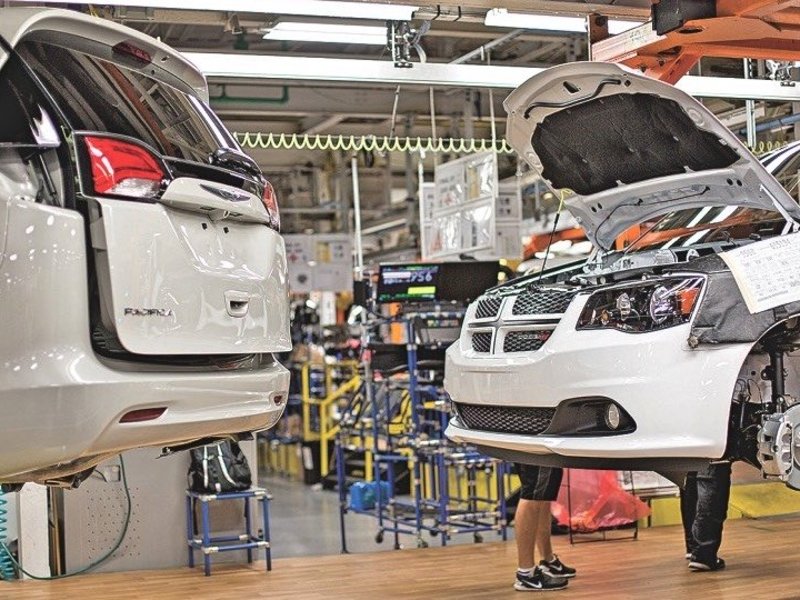
Unifor President Jerry Dias on Thursday said he is “cautiously optimistic” that Canadian plants will be able to re-open in the early May timetable sought by several automakers.
“We will give the green light at the end of the day if our local union leadership feels comfortable with that,” Dias told Automotive News Canada. “I’m going to have another call tomorrow with the heads of all of our locals at the auto plants to make sure things are still moving properly. But as of now, we haven’t heard this big outcry saying, ‘Don’t do it, it’s too early.’ We haven’t heard any of that.”
His comments come after UAW President Rory Gamble said it would be “too risky” for U.S. workers and their families if auto plants restarted in early May. Auto factories in Canada and the U.S. have been shut down since mid-March due to the COVID-19 pandemic, and companies and unions in North America have been grappling in recent weeks with finding ways to safely restart production while preventing the spread of the virus.
Dias said he understands why the UAW would oppose the early May production startup because the U.S. has been hit harder by the pandemic than Canada. The U.S. has more than 861,000 confirmed COVID-19 cases and more than 46,300 deaths — the most in the world. That compares with about 42,000 cases and 2,000 deaths in Canada, according to Health Canada.
“The impact that we have had has been significant, but we haven’t had the types of deaths and realities that they’ve had to deal with, especially in Michigan,” said Dias, whose union represents 14,500 hourly workers at Ford, General Motors and Fiat Chrysler Automobiles plants.
Michigan, home to Detroit and the UAW’s headquarters, has the third-highest death count and seventh-highest total case count among the 50 U.S. states, according to the New York Times. In the U.S., more than 20 workers for the Detroit automakers have died, according to a count by Automotive News.
In Canada, meanwhile, auto industry cases have been kept to “a handful,” Dias said.
“We dodged a major bullet here, for sure,” he said. “The UAW has had a hell of a lot more confirmed cases of COVID-19 and have had deaths, and we haven’t had the deaths or anywhere near the numbers.”
FCA Canada spokeswoman LouAnn Gosselin said on Thursday that “a very small number” of Canadian workers have contracted the virus, but declined to disclose how many or where they work.
FCA, which has two assembly plants in Ontario, is aiming to begin restarting its U.S. and Canadian factories on May 4. Automotive News, citing a webinar FCA hosted with suppliers this month, reported on April 16 that the company planned to re-open the Brampton, Ont., plant on May 4, followed two weeks later by the Windsor, Ont., plant on May 18.
In statements earlier this week, GM Canada and Ford of Canada both declined to commit to a firm restart date, though Automotive News reported that information given to employees and suppliers indicated that Ford and GM were considering a similar time frame.
“As of now, we’re proceeding” with the proposed timelines, Dias said. “But that could change at any minute.
Dias said Unifor and the Detroit Three remain in “constant communication” about safety standards and new protocols. Automotive News Canada reported on Wednesday that protocols being discussed include mandatory temperature checks and dividers being installed between work stations that are in close proximity.
Similar discussions were taking place between the UAW and automakers in the U.S. While Gamble, the UAW president, said the union was “happy with the auto companies’ response and cooperation” on drawing up health protocols, he said it would be unwise to return to work in early May.
“At this point in time, the UAW does not believe the scientific data is conclusive that it is safe to have our members back in the workplace,” Gamble said in a statement. “We have not done enough testing to really understand the threat our members face. We want to make sure the scientific data is supportive and every possible health protocols and enhanced protections are in place before UAW members walk into the workplace.”
A UAW spokesman said the union has agreed to voluntary assignments for its members as long as safety protocols are in place, as has been the case during the shutdown at plants where automakers are building medical equipment and protective gear.
When asked if the union would keep workers home should the automakers reopen their plants May 4, the spokesman said: “We continue to have dialogue with the Detroit 3.”
Michael Martinez contributed to this report.